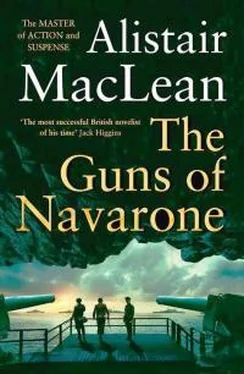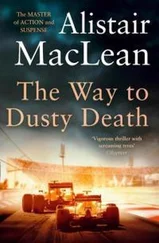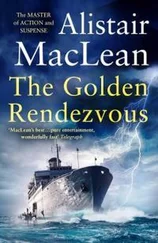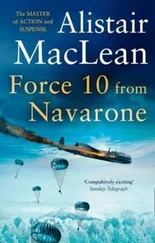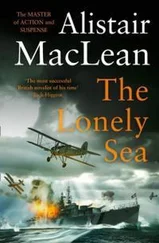1 ...8 9 10 12 13 14 ...71 Alone in the wheelhouse – an unusual feature in so tiny a caique – Lieutenant Andy Stevens watched the Turkish coast slide slowly by. Like Mallory’s, his eyes moved ceaselessly, but not with the same controlled wandering. They shifted from the coast to the chart: from the chart to the islands up ahead off the port bow, islands whose position and relation to each other changed continually and deceptively, islands gradually lifting from the sea and hardening in definition through the haze of blue refraction: from the islands to the old alcohol compass swinging almost imperceptibly on corroded gimbals, and from the compass back to the coast again. Occasionally, he peered up into the sky, or swung a quick glance through a 180-degree sweep of the horizon. But one thing his eyes avoided all the time. The chipped, fly-blown mirror had been hung up in the wheelhouse again, but it was as if his eyes and the mirror were of opposite magnetic poles: he could not bring himself to look at it.
His forearms ached. He had been spelled at the wheel twice, but still they ached, abominably: his lean, tanned hands were ivory-knuckled on the cracked wheel. Repeatedly, consciously, he tried to relax, to ease the tension that was bunching up the muscles of his arms; but always, as if possessed of independent volition, his hands tightened their grip again. There was a funny taste in his mouth, too, a sour and salty taste in a dry, parched mouth, and no matter how often he swallowed, or drank from the sun-warmed pitcher at his side, the taste and the dryness remained. He could no more exorcise them than he could that twisting, cramping ball that was knotting up his insides, just above the solar plexus, or the queer, uncontrollable tremor that gripped his right leg from time to time.
Lieutenant Andy Stevens was afraid. He had never been in action before, but it wasn’t that. This wasn’t the first time he had been afraid. He had been afraid all his life, ever since he could remember: and he could remember a long way back, even to his early prep-school days when his famous father, Sir Cedric Stevens, the most celebrated explorer and mountaineer of his time, had thrown him bodily into the swimming pool at home, telling him that this was the only way he could learn to swim. He could remember still how he had fought and spluttered his way to the side of the pool, panic-stricken and desperate, his nose and mouth blocked with water, the pit of his stomach knotted and constricted in that nameless, terrifying ache he was to come to know so well: how his father and two elder brothers, big and jovial and nerveless like Sir Cedric himself, had wiped the tears of mirth from their eyes and pushed him in again . . .
His father and brothers . . . It had been like that all through his schooldays. Together, the three of them had made his life thoroughly miserable. Tough, hearty, open-air types who worshipped at the shrine of athleticism and physical fitness, they could not understand how anyone could fail to revel in diving from a five-metre springboard or setting a hunter at a five-barred gate or climbing the crags of the Peak district or sailing a boat in a storm. All these things they had made him do and often he had failed in the doing, and neither his father nor his brothers could ever have understood how he had come to dread those violent sports in which they excelled, for they were not cruel men, nor even unkind, but simply stupid. And so to the simple physical fear he sometimes and naturally felt was added the fear of failure, the fear that he was bound to fail in whatever he had to do next, the fear of the inevitable mockery and ridicule: and because he had been a sensitive boy and feared the ridicule above all else, he had come to fear these things that provoked the ridicule. Finally, he had come to fear fear itself, and it was in a desperate attempt to overcome this double fear that he had devoted himself – this in his late teens – to crag and mountain climbing: in this he had ultimately become so proficient, developed such a reputation, that father and brothers had come to treat him with respect and as an equal, and the ridicule had ceased. But the fear had not ceased, rather it had grown by what it fed on, and often, on a particularly difficult climb, he had all but fallen to his death, powerless in the grip of sheer, unreasoning terror. But this terror he had always sought, successfully so far, to conceal. As now. He was trying to overcome, to conceal that fear now. He was afraid of failing – in what he wasn’t quite sure – of not measuring up to expectation: he was afraid of being afraid: and he was desperately afraid, above all things, of being seen, of being known to be afraid . . .
The startling, incredible blue of the Aegean; the soft, hazy silhouette of the Anatolian mountains against the washed-out cerulean of the sky; the heart-catching, magical blending of the blues and violets and purples and indigoes of the sun-soaked islands drifting lazily by, almost on the beam now; the iridescent rippling of the water tanned by the gentle, scent-laden breeze newly sprung from the south-east; the peaceful scene on deck, the reassuring, interminable thump-thump thump-thump of the old Kelvin engine . . . All was peace and quiet and contentment and warmth and languor, and it seemed impossible that anyone could be afraid. The world and the war were very far away that afternoon.
Or perhaps, after all, the war wasn’t so far away. There were occasional pin-pricks – and constant reminders. Twice a German Arado seaplane had circled curiously overhead, and a Savoia and Fiat, flying in company, had altered course, dipped to have a look at them and flown off, apparently satisfied: Italian planes, these, and probably based on Rhodes, they were almost certainly piloted by Germans who had rounded up their erstwhile Rhodian allies and put them in prison camps after the surrender of the Italian Government. In the morning they had passed within half a mile of a big German caique – it flew a German flag and bristled with mounted machine-guns and a two-pounder far up in the bows; and in the early afternoon a high-speed German launch had roared by so closely that their caique had rolled wickedly in the wash of its passing: Mallory and Andrea had shaken their fists and cursed loudly and fluently at the grinning sailors on deck. But there had been no attempts to molest or detain them: neither British nor German hesitated at any time to violate the neutrality of Turkish territorial waters, but by the strange quixotry of a tacit gentlemen’s agreement hostilities between passing vessels and planes were almost unknown. Like the envoys of warring countries in a neutral capital, their behaviour ranged from the impeccably and frigidly polite to a very pointed unawareness of one another’s existence.
These, then, were the pin-pricks – the visitation and by-goings, harmless though they were, of the ships and planes of the enemy. The other reminders that this was no peace but an illusion, an ephemeral and a frangible thing, were more permanent. Slowly the minute hands of their watches circled, and every tick took them nearer to that great wall of cliff, barely eight hours away, that had to be climbed somehow: and almost dead ahead now, and less than fifty miles distant, they could see the grim, jagged peaks of Navarone topping the shimmering horizon and reaching up darkly against the sapphired sky, desolate and remote and strangely threatening.
• • •
At half-past two in the afternoon the engine stopped. There had been no warning coughs or splutters or missed strokes. One moment the regular, reassuring thump-thump: the next, sudden, completely unexpected silence, oppressive and foreboding in its absoluteness.
Mallory was the first to reach the engine hatch.
‘What’s up, Brown?’ His voice was sharp with anxiety. ‘Engine broken down?’
Читать дальше
Конец ознакомительного отрывка
Купить книгу
